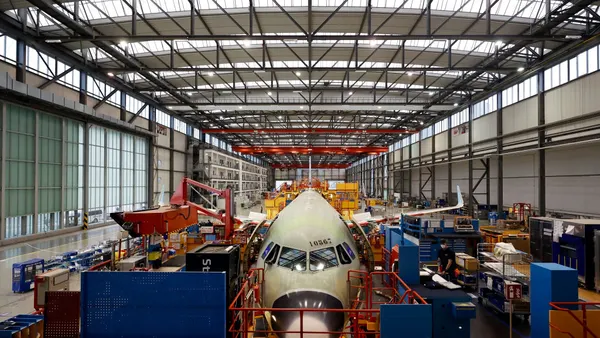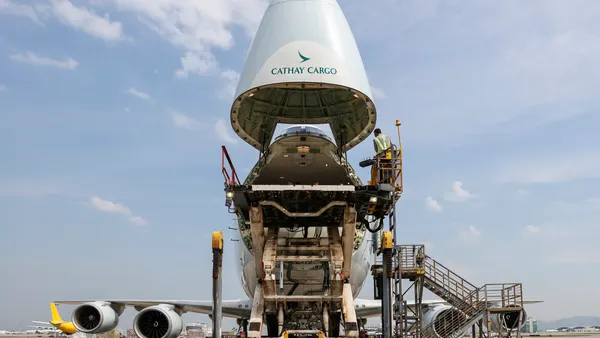Dive Brief:
- Shippers and freight forwarders are stalling on making longer-term commitments on air cargo capacity as international trade tensions heat up, according to an April 3 Xeneta report.
- Seventy-nine percent of shipper contracts negotiated in Q1 were short-term agreements of three months or fewer, up nearly 20 percentage points year over year, Xeneta said. Forwarders are opting to keep about 45% of volumes on the spot market.
- “With the growth of rates slowing overall, we’d normally expect to see shippers making longer capacity commitments to achieve more competitive rates, but, right now, this is clearly a gamble few shippers are ready to take – and this is before we’re even seeing tariffs impacting volumes,” said Niall van de Wouw, Xeneta’s chief airfreight officer.
Dive Insight:
President Donald Trump’s tariff-heavy trade strategy is sending shocks throughout supply chains, leading to volatility in the air cargo market, especially for shipments between China and the U.S.
Earlier this month, the U.S. hiked reciprocal tariffs on imports from China to 125%, pushing the potential duty burden on imports from the country to as much as 245%, per the White House. China countered with a tariff hike to 125% on U.S. imports, further escalating tensions.
In such a turbulent environment, even if capacity agreements have escape clauses, it is risky for shippers and freight forwarders to commit to a fixed rate for a year, according to van de Wouw
“If they agree a plan for the year now, it could turn out to be much costlier in the longer-term,” he said.
The planned reinstatement of a ban on the de minimis exemption for imports from China and Hong Kong in May is also roiling the air cargo market.
E-commerce shipments from China to the U.S., many of which rely on the provision, make up roughly half of the trade lane’s available cargo capacity and 6% of global air freight demand, Xeneta reported. Any disruption to that demand will free up a sizeable share of cargo capacity, which would impact other parts of the market.
Xeneta reported that the U.S.’ temporary lifting of its de minimis ban on China-originating shipments spurred a recovery in Transpacific e-commerce demand in March, but that is likely to change once the ban returns next month. Still, March marked the third consecutive month of subdued single-digit global air cargo demand growth.
“Clearly, everyone will be waiting to see how the removal of the de minimis threshold and all the global tariffs already announced and those still to come will impact trade, as well as how quickly there will be less demand and, consequently, less airfreight,” van de Wouw said. “It’s all expectations right now, but we must expect the situation will get worse before it gets better.”











